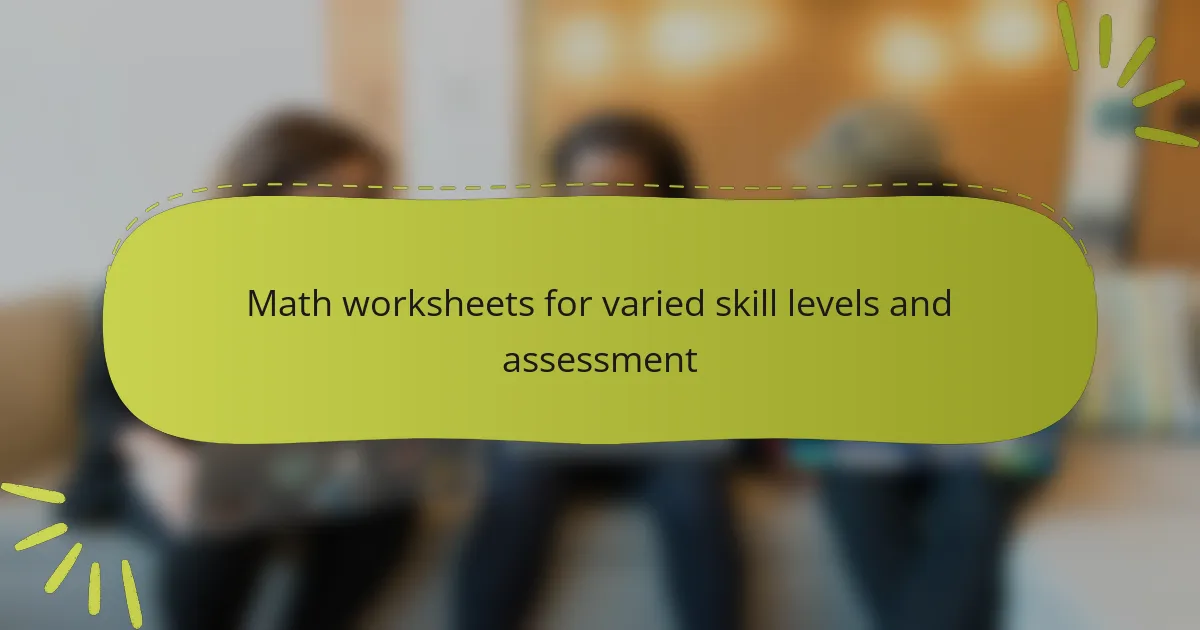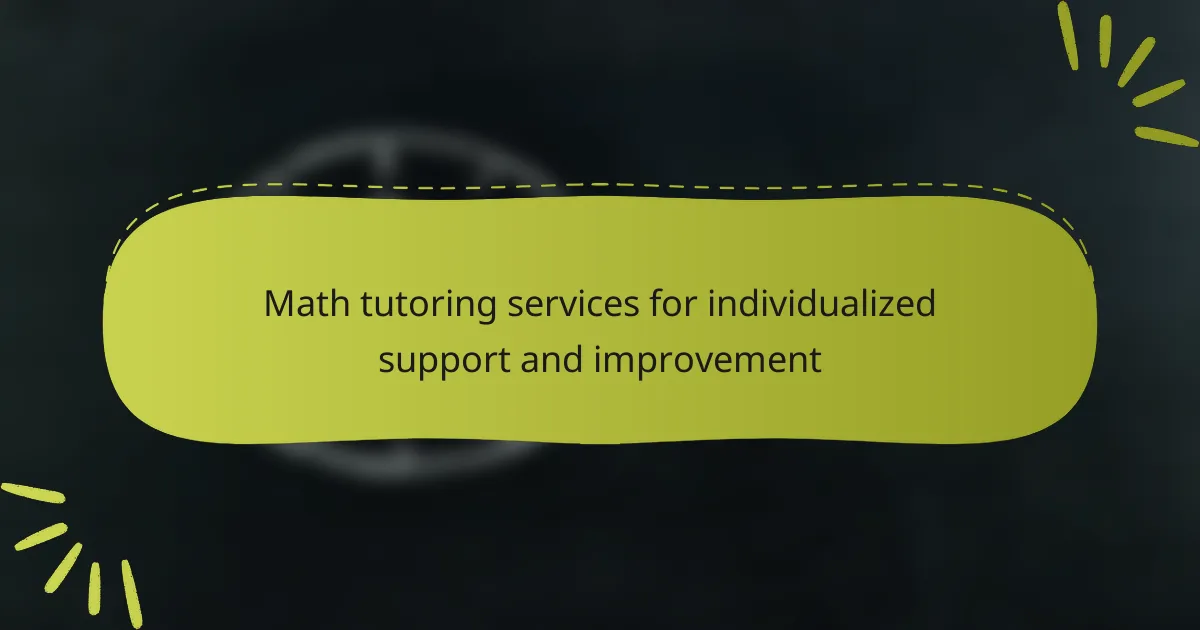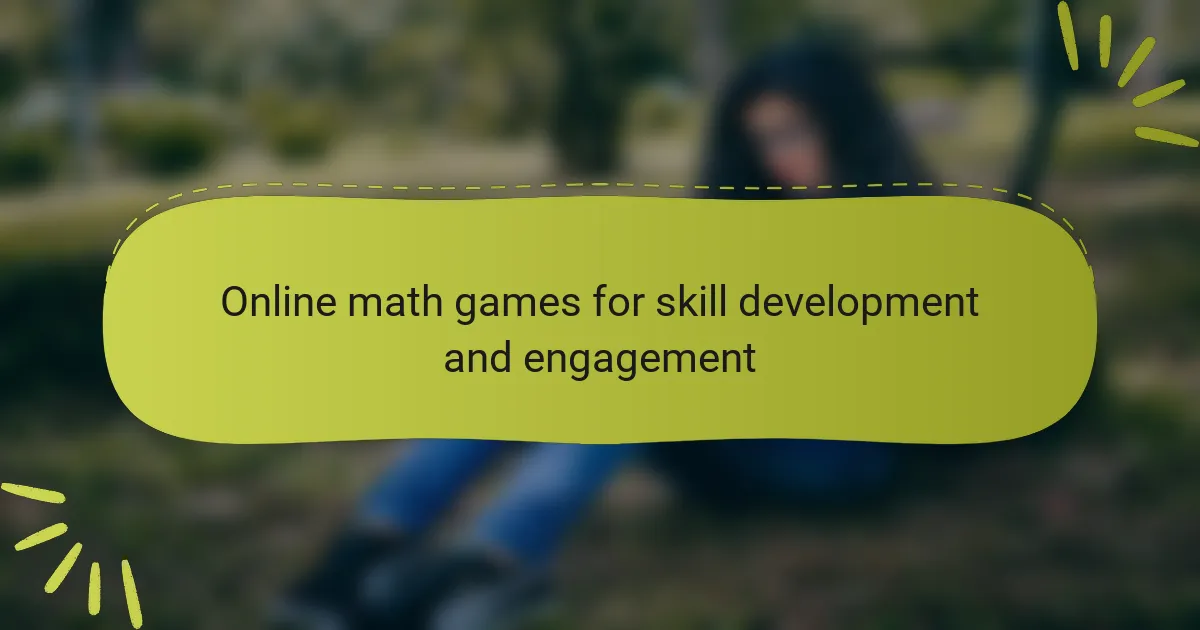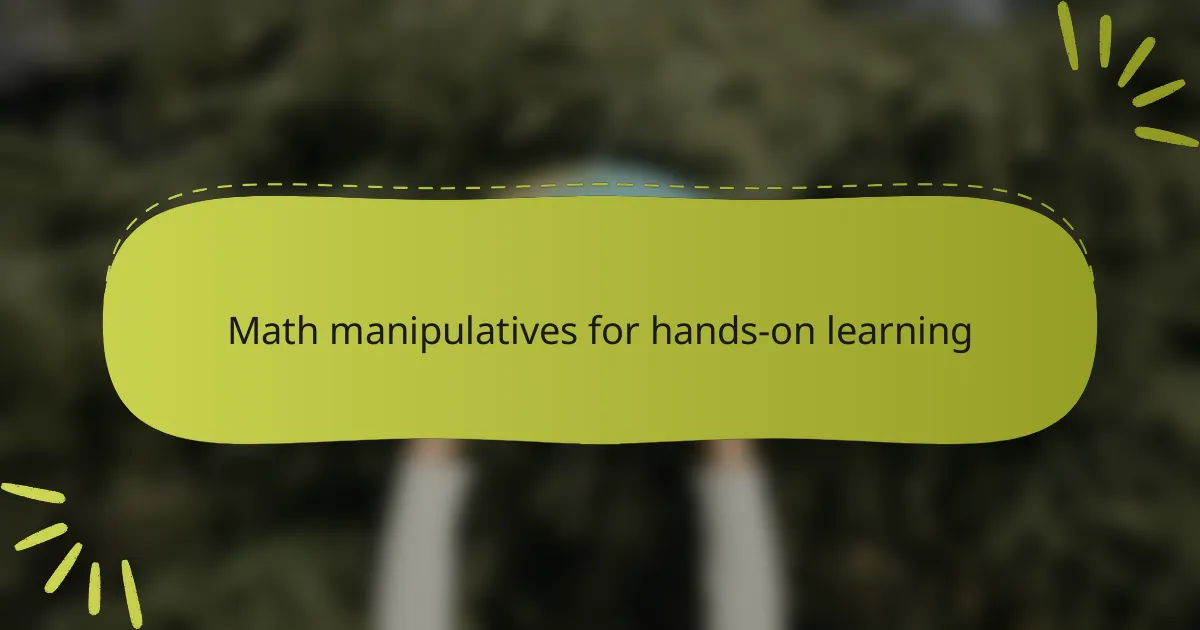Math competitions are structured events where individuals or teams tackle mathematical problems within a set timeframe. These competitions emphasize critical and creative thinking, requiring participants to apply logical reasoning and mathematical concepts effectively. Teamwork is a significant aspect, as participants collaborate to share ideas and strategies, enhancing their communication skills. Research indicates that involvement in math competitions leads to improved problem-solving abilities, often reflected in higher scores on standardized tests. This article explores how math competitions serve as a platform for developing both individual and collective problem-solving skills and fostering teamwork.
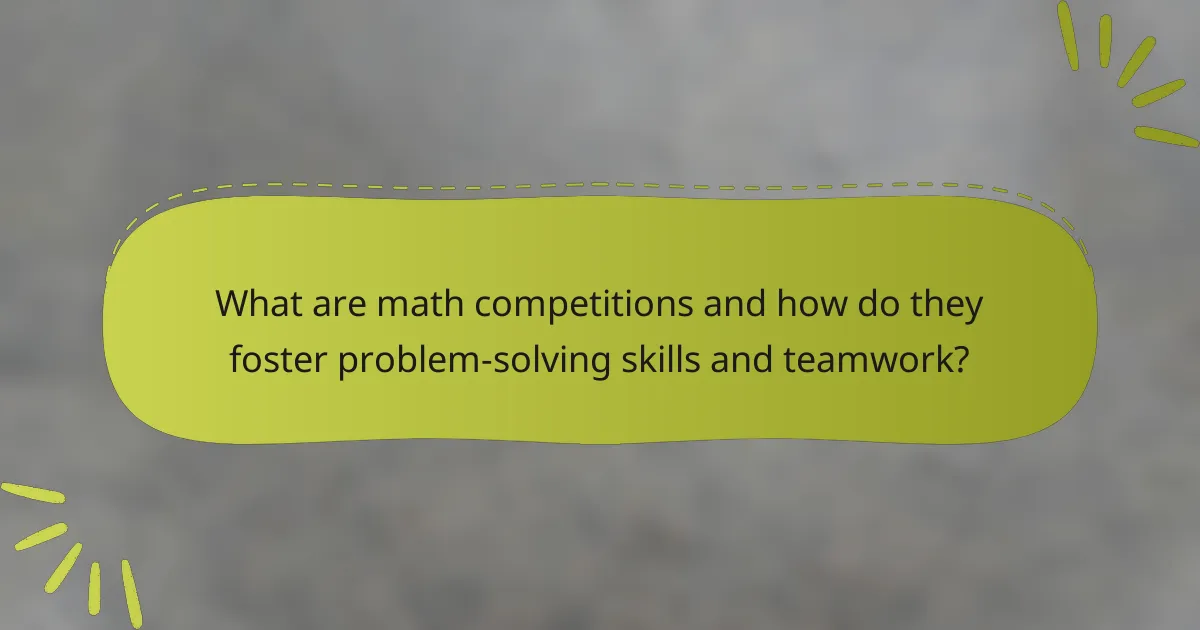
What are math competitions and how do they foster problem-solving skills and teamwork?
Math competitions are organized events where individuals or teams solve mathematical problems under timed conditions. These competitions challenge participants to think critically and creatively. They require logical reasoning and the application of mathematical concepts. Participants often work in teams, fostering collaboration and communication. This teamwork enhances their ability to share ideas and strategies. Research shows that engaging in math competitions improves overall problem-solving skills. For example, students who participate in these events often score higher on standardized tests. Thus, math competitions effectively develop both individual and collective problem-solving abilities.
What types of math competitions exist?
There are several types of math competitions. These include individual competitions, team competitions, and online competitions. Individual competitions focus on personal problem-solving skills. Examples include the AMC (American Mathematics Competitions) and the International Mathematical Olympiad (IMO). Team competitions require collaboration among participants. Notable examples are Mathcounts and the ARML (American Regions Mathematics League). Online competitions have gained popularity, allowing global participation. Events like the Purple Comet! Math Meet exemplify this format. Each type of competition fosters problem-solving skills and teamwork in unique ways.
How do individual competitions differ from team competitions?
Individual competitions focus on the performance of a single participant, while team competitions involve collaboration among multiple participants. In individual competitions, each contestant is responsible for their own success and must solve problems independently. Conversely, team competitions require members to work together, combining their strengths to tackle challenges.
Individual competitions often emphasize personal achievement and recognition. For example, math Olympiads typically award medals based on individual scores. Team competitions, such as math relays, highlight collective effort and often award prizes to the entire team based on combined performance.
Additionally, the strategies employed differ; individuals rely on their own problem-solving skills, while teams may discuss and strategize together. This collaboration can lead to enhanced learning experiences, as participants share diverse approaches to problem-solving.
What are some popular math competitions for students?
Some popular math competitions for students include the Math Olympiad, AMC (American Mathematics Competitions), and MathCounts. The Math Olympiad is an international competition that challenges students with complex problems. AMC consists of various levels, allowing students to compete according to their grade. MathCounts focuses on middle school students and emphasizes teamwork and problem-solving. These competitions foster critical thinking and collaboration among participants. They also provide recognition and opportunities for scholarships. Participation in these events can enhance students’ mathematical skills and confidence.
Why are problem-solving skills important in math competitions?
Problem-solving skills are crucial in math competitions because they enable participants to tackle complex problems effectively. These competitions often present unique challenges that require creative thinking and analytical abilities. Problem-solving skills help competitors identify patterns and devise strategies to arrive at solutions. Moreover, they enhance the ability to work under time constraints, which is a common aspect of math competitions. Research shows that students who engage in competitive problem-solving develop stronger critical thinking skills. This development is essential for academic success and real-world applications. Thus, problem-solving skills significantly contribute to performance and achievement in math competitions.
How do math competitions challenge participants’ problem-solving abilities?
Math competitions challenge participants’ problem-solving abilities by presenting complex problems that require critical thinking. These problems often involve advanced concepts and unconventional approaches. Participants must analyze, strategize, and implement solutions under time constraints. This environment fosters quick decision-making and adaptability. Moreover, competitions encourage collaboration among team members, enhancing collective problem-solving skills. Research indicates that engaging in such competitions improves mathematical reasoning and creativity. A study by the National Council of Teachers of Mathematics found that students participating in math contests showed significant improvement in problem-solving performance.
What techniques can participants use to enhance their problem-solving skills?
Participants can enhance their problem-solving skills through techniques such as collaborative learning, practice with diverse problems, and reflective thinking. Collaborative learning involves working together in groups to tackle complex problems. This approach fosters discussion and the exchange of ideas, leading to deeper understanding. Practicing with diverse problems helps participants encounter various problem types and strategies. This exposure builds adaptability in problem-solving. Reflective thinking encourages participants to analyze their thought processes after solving problems. This self-assessment helps identify strengths and areas for improvement. Research shows that engaging in these techniques can significantly boost problem-solving abilities in competitive environments.
How does teamwork play a role in math competitions?
Teamwork is crucial in math competitions as it enhances problem-solving efficiency. Collaborative efforts allow team members to share diverse perspectives. This diversity can lead to innovative solutions that an individual might overlook. Teamwork also fosters communication skills, essential for discussing complex mathematical concepts. Moreover, working together helps distribute the workload, making it easier to tackle challenging problems. Statistics show that teams often outperform individuals in competitive settings. In many math competitions, such as the American Mathematics Competitions (AMC), teamwork is a core component of the format. This collaborative approach not only improves performance but also builds camaraderie among participants.
What strategies can teams use to improve collaboration during competitions?
Teams can improve collaboration during competitions by establishing clear communication channels. Regular check-ins can help ensure everyone is on the same page. Utilizing collaborative tools, such as shared documents, enhances real-time teamwork. Assigning specific roles can clarify responsibilities and streamline efforts. Practicing problem-solving together builds trust and understanding among team members. Setting common goals fosters a sense of unity and purpose. Encouraging open feedback helps teams refine their strategies. Research shows that teams with strong collaboration outperform others in competitive settings.
How does effective communication impact team performance in math competitions?
Effective communication significantly enhances team performance in math competitions. Clear communication enables team members to share ideas and strategies efficiently. It fosters collaboration, allowing individuals to leverage each other’s strengths. Teams that communicate effectively can solve problems more quickly. They can also clarify doubts and avoid misunderstandings during competitions. Studies show that teams with strong communication skills often outperform those with weaker skills. For instance, a study by the Educational Testing Service found that collaborative problem-solving leads to better outcomes in competitive settings. Therefore, effective communication is crucial for success in math competitions.
What are the educational benefits of participating in math competitions?
Participating in math competitions enhances critical thinking and problem-solving skills. These competitions challenge students to apply mathematical concepts in innovative ways. They often require quick thinking and effective time management. Students learn to tackle complex problems under pressure. This experience fosters resilience and adaptability. Additionally, math competitions promote teamwork through collaborative problem-solving. Participants often work in groups, enhancing communication and interpersonal skills. Research shows that students involved in competitions score higher in math assessments. A study by the American Mathematical Society found that competition participants demonstrate improved academic performance. Overall, math competitions provide valuable educational benefits that extend beyond the classroom.
How do math competitions contribute to students’ academic growth?
Math competitions enhance students’ academic growth by improving their problem-solving skills and critical thinking. Participation encourages deeper understanding of mathematical concepts. Students learn to approach complex problems systematically. They develop resilience through tackling challenging questions. Competitions also foster teamwork and collaboration among peers. Working in groups helps students share diverse strategies. Engaging in competitions can lead to higher academic performance in mathematics. Research indicates that students involved in math contests often achieve better grades. These experiences prepare students for advanced studies and real-world applications.
What skills beyond math are developed through competition participation?
Participation in competitions develops critical thinking, teamwork, and time management skills. Critical thinking enhances problem-solving abilities by requiring participants to analyze and evaluate complex problems. Teamwork fosters collaboration, as participants often work in groups to tackle challenges. Time management skills improve as competitors learn to allocate their time effectively during events. These skills are essential in academic and professional settings. Research shows that students involved in competitive environments often perform better academically and develop stronger interpersonal skills.
How can students prepare for math competitions effectively?
Students can prepare for math competitions effectively by practicing problem-solving regularly. They should solve past competition papers to familiarize themselves with the format and types of questions. Joining math clubs or study groups can enhance collaborative problem-solving skills. Utilizing online resources, such as math competition websites, provides access to a variety of practice problems. Students should also seek mentorship from teachers or experienced competitors for guidance. Time management during practice sessions is crucial for developing speed and accuracy. Engaging in mock competitions helps simulate the actual environment and build confidence. Regular review of mathematical concepts ensures a solid foundation for tackling complex problems.
What resources are available for students to practice math competition problems?
Students can access various resources to practice math competition problems. Online platforms like Art of Problem Solving offer a wealth of practice problems and forums for discussion. Books such as “The Art and Craft of Problem Solving” provide in-depth strategies and examples. Local math clubs often hold practice sessions and competitions. Additionally, websites like Brilliant and Khan Academy feature interactive problem sets tailored for competition preparation. National Math Olympiad and AMC resources provide past exam papers for practice. These resources collectively enhance students’ problem-solving skills and readiness for competitions.
How can students form study groups to enhance their preparation?
Students can form study groups by identifying common study goals. They should find peers who share similar academic interests. Creating a schedule for regular meetings enhances consistency. Selecting a conducive environment for studying improves focus. Each member should contribute by sharing resources and knowledge. Utilizing collaborative tools can facilitate communication and organization. Research shows that group study can improve understanding and retention of material. A study by the University of Texas found that students in study groups performed better on exams than those studying alone.
What are some best practices for success in math competitions?
Practice regularly to improve problem-solving skills. Consistent practice helps in familiarizing with different types of problems. Participate in mock competitions to simulate the actual environment. This builds time management skills and reduces anxiety. Study previous competition problems to understand common themes and question formats. Collaborate with peers to discuss strategies and solutions. This enhances teamwork and exposes different approaches. Focus on mastering fundamental concepts, as they are often the basis for complex problems. Lastly, maintain a positive mindset to encourage resilience during challenging problems.
How can students manage their time effectively during competitions?
Students can manage their time effectively during competitions by setting clear priorities. They should analyze the competition format to understand the time limits for each section. Creating a time allocation plan for each question or section is essential. This plan should reflect the difficulty and point value of each question. Regularly checking the clock helps students stay aware of their progress. If a question is too time-consuming, they should move on and return to it later. Practicing under timed conditions before the competition prepares students for the actual event. Research indicates that students who practice time management strategies score higher in competitive settings.
What mindset should participants adopt to perform their best?
Participants should adopt a growth mindset to perform their best. A growth mindset emphasizes the belief that abilities can be developed through dedication and hard work. This perspective fosters resilience in the face of challenges. It encourages participants to view failures as opportunities for learning. Research shows that individuals with a growth mindset achieve higher levels of success. A study by Dweck (2006) in “Mindset: The New Psychology of Success” supports this claim. Participants who embrace this mindset are more likely to collaborate effectively and enhance their problem-solving skills.
Math competitions serve as structured events where individuals or teams engage in solving mathematical problems under timed conditions, fostering critical thinking and teamwork. The article explores various types of math competitions, including individual and team formats, and highlights their role in enhancing problem-solving skills. It discusses the importance of effective communication and collaboration in team settings, as well as techniques participants can use to improve their problem-solving abilities. Additionally, the article outlines best practices for preparation and time management, emphasizing the educational benefits and skills developed through participation in these competitions.
